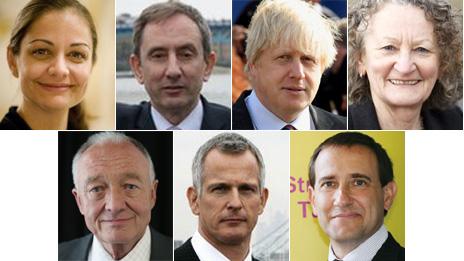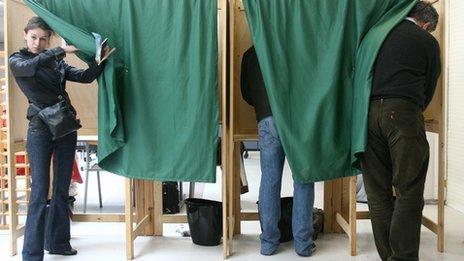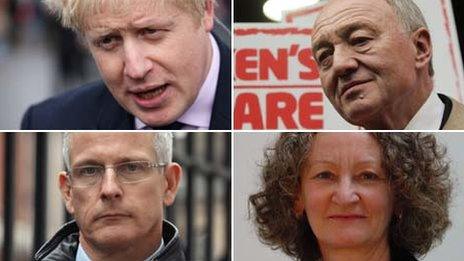Transport fares: To cut or not to cut?
- Published
- comments
Fares are central to 3 May's mayoral election and I have been delving into the complex world of Transport for London's (TfL) accounts to try to work out what is what.
The main points are that Conservative candidate Boris Johnson's own TfL business plan is based on fare increases of inflation plus 2%.
During Sunday night's BBC London mayoral debate Mr Johnson did also say that he would look at ways to "bear down" on fares in 2013.
There is not much detail as to how he will do that.
Mr Johnson has mentioned further efficiencies at TfL before, when we questioned him earlier this month in the BBC London studio. Or he could ask the Treasury for more money, as he did this year.
The mayor and TfL say the high fare rises are needed to enable investment in infrastructure for projects like Crossrail and Tube upgrades.
But crucially, it's also to counter a massive grant cut to TfL from the coalition government of £2.2bn over the next few years.
Labour candidate Ken Livingstone says he can cut fares by 7% and not cut, reduce or delay services or infrastructure improvements. If he doesn't manage that he says he will quit.
Few doubt he can do it - even TfL says he could. The question is what will the repercussions be?
Many transport commentators believe that a 7% fare cut will lead to infrastructure projects being delayed in the long-term, or Mr Livingstone having to go cap in hand to central government for more money.
Fullfact.org, external - an independent fact checking organisation - says Mr Livingstone needs to do more to show it is possible, and up to now the accounts show the surpluses have been spent.
Very tricky
On the subject of surpluses, a thing to note is that £277m of one surplus has been spent on restructuring the Tube Lines' £1.6bn debt.
Tube Lines (a subsidiary of TfL) was brought in-house at the behest of Mayor Johnson after it continued to miss deadlines on the Jubilee Line upgrade.
TfL claims restructuring the debt will save millions in the long-term as it can use TfL's better credit rating on the debt and that will save money.
Mr Livingstone believes that could have been used to cut fares in the short-term.
At the weekend, a group of academics wrote to the Guardian and said Ken Livingstone's 7% drop was possible.
In the letter, external they say: "In the current financial year TfL estimates the surplus will be £830m before exceptional items of expenditure."
And that's the point. TfL says those "exceptional items" are allocated on things like restructuring Tube Lines debt.
The question is how and when and on what those exceptional items are spent.
TfL also says surpluses in Quarter 1 & Quarter 2 automatically transfer over into the £4.5bn capital infrastructure budget.
As I've mentioned before here, dropping fares on the overground trains in London, and therefore Travelcards, without agreement from the Department of Transport (DfT) would also be very tricky.
Previously Transport Secretary Justine Greening has said: "A cut in TfL's fares revenues would risk breaching the terms of the government's funding settlement with TfL."
What that means is a 7% fare cut would mean TfL's funding from central government could actually be cut.
- Published12 April 2012

- Published3 April 2012

- Published29 March 2012
